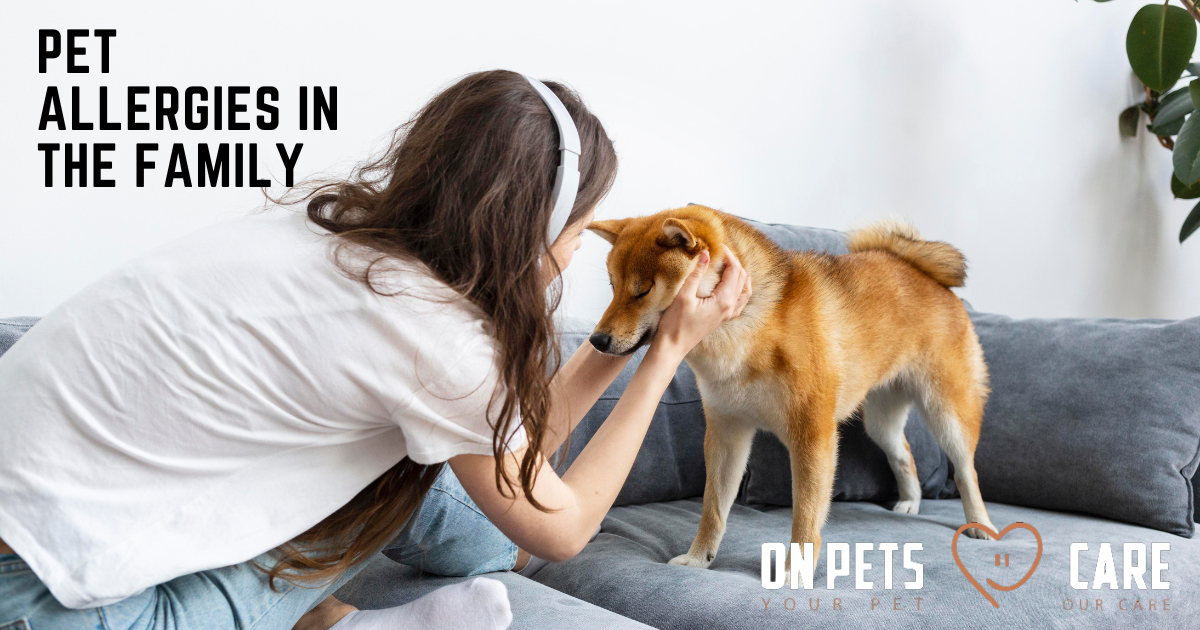Expert Tips for Managing Pet Allergies in the Family
Pets bring immeasurable joy to our lives, but for some, they can also bring unwanted sniffles, sneezes, and itchy eyes. Living with in the family can be challenging, but fear not! With the right strategies and a touch of positive thinking, you can create a harmonious home where both your furry friend and your family members can thrive. In this article, we’ll dive into some tips for managing pet allergies in the family that will help you coexist with your beloved pets without sacrificing anyone’s comfort. Also, we will talk about the symptoms of being allergic to cats.
1. Understanding the Symptoms
Before we dive into the solutions, let’s take a moment to understand the enemy. Symptoms of being allergic to cats can vary from person to person but often include sneezing, coughing, wheezing, itchy skin, and watery eyes. Identifying these symptoms early on can help you take proactive measures to manage allergies effectively.
2. Allergy-Friendly Pet Breeds
If you’re considering adding a new member to your fur family, opt for hypoallergenic pet breeds. Breeds like Poodle, Bichon Frisé, and Devon Rex cats are known to produce fewer allergens, making them more suitable for allergic individuals. Research different breeds and choose one that aligns with your family’s needs.
3. Create Pet-Free Zones
Designate specific areas in your home as pet-free zones, such as bedrooms or certain furniture. This will provide allergy sufferers with safe spaces where they can retreat to find relief from allergens.
4. Regular Grooming
Keeping your pets well-groomed is a crucial step in reducing allergens. Regular baths, brushing, and trimming can help minimize the amount of loose fur and dander in your home environment.
5. High-Quality Air Purifiers
Invest in high-quality air purifiers equipped with HEPA filters. These filters are designed to trap even the tiniest allergen particles, improving indoor air quality and making it easier for everyone to breathe.
6. Clean, Clean, Clean
Frequent cleaning is your best friend in the fight against pet allergens. Vacuum carpets, rugs, and upholstery regularly using a vacuum cleaner equipped with a HEPA filter. Don’t forget to wash your pet’s bedding, toys, and any other items they frequently come into contact with.
7. HEPA Vacuuming and Mopping
Traditional vacuuming can sometimes release allergens back into the air. Consider using a vacuum cleaner with a HEPA filter and a mop to trap and remove allergens effectively from floors and surfaces.
8. Allergen-Reducing Products
Explore allergen-reducing products such as hypoallergenic pet shampoos and wipes. These products can help minimize the spread of allergens by targeting them at the source.
9. Professional Cleaning Services
Periodically hiring professional cleaning services can give your home a deep clean, ensuring that allergens are removed from hidden nooks and crannies.
10. Manage Indoor Humidity
Maintain optimal indoor humidity levels, typically between 30% and 50%, to prevent the growth of mold and dust mites, which can exacerbate allergies.
11. Consider Allergy Medications
Consult a medical professional about allergy medications that can provide relief during peak allergy seasons or when symptoms become particularly bothersome.
12. Regular Vet Visits
Ensure your pets are healthy and receive regular veterinary care. A healthy pet is less likely to shed excessive fur and dander.
13. Allergy-Appropriate Flooring
Consider replacing carpets with hardwood or tile floors, as these surfaces are easier to clean and don’t trap allergens as much.
14. Teach Good Hygiene Practices
Teach family members, especially children, the importance of good hygiene practices after interacting with pets. Washing hands and changing clothes can prevent allergen transfer.
15. Onpets Care and Grooming
Remember, proper pet care and grooming can go a long way in reducing allergens. Regularly bathe and groom your pets using Onpets Care products designed to minimize allergen production.
In conclusion, living with and managing pet allergies in the family doesn’t mean you have to bid farewell to your beloved pets. By implementing these expert tips for managing pet allergies in the family, you can create a harmonious home where everyone can enjoy the company of their furry companions without discomfort.
FAQs About Managing Pet Allergies
Q1: Are there any specific dog breeds that are better for people with allergies?
A: Yes, hypoallergenic breeds like Poodles and Bichon Frises tend to produce fewer allergens.
Q2: Can allergy symptoms develop over time even if I’ve had pets for years?
A: Yes, allergies can develop or worsen over time, so it’s important to stay vigilant to any changes in your symptoms.
Q3: How often should I groom my pet to reduce allergens?
A: Regular grooming, including bathing and brushing, can significantly reduce allergens. Aim for at least once a week.
Q4: Can air purifiers eliminate pet allergens from the air?
A: While air purifiers with HEPA filters can greatly reduce allergen levels, they might not eliminate them. Regular cleaning is still necessary.
Q5: Can I take over-the-counter allergy medications for pet allergies?
A: Over-the-counter antihistamines can provide relief, but it’s best to consult a medical professional before starting any medication regimen.



